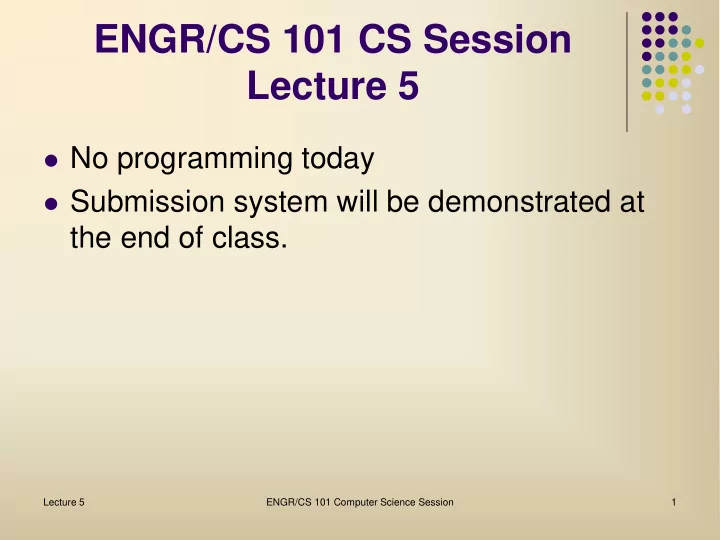

ENGR/CS 101 CS Session Lecture 5 No programming today Submission system will be demonstrated at the end of class. Lecture 5 ENGR/CS 101 Computer Science Session 1
Outline Problem: How to send a secret message? Codes and ciphers Substitution ciphers Lecture 5 ENGR/CS 101 Computer Science Session 2
Problem: How to send a secret message? Steganography ("concealed writing"): science of sending concealed messages. Includes physical concealment like invisible ink, microdots... Cryptography ("hidden writing"): how to obscure message so it cannot be read even if intercepted. Use codes and ciphers. Lecture 5 ENGR/CS 101 Computer Science Session 3
Codes & Ciphers Code : whole words or phrases replaced by a word, letter, or a number. Like an alien language; uses translation code book. Cipher : individual letters are replaced by other letters or symbols. Plaintext : message in normal language Ciphertext : message in secret form Lecture 5 ENGR/CS 101 Computer Science Session 4
Ciphers Transposition cipher: rearrange letters of message. Scytale: strip of writing material wrapped around a dowel; write message across dowel. Block: arrange message into a block, rewrite vertical lines Substitution cipher: replace letters with other letters Lecture 5 ENGR/CS 101 Computer Science Session 5
Cipher = Algorithm + Key Algorithm : a series of well-defined steps that can be followed as a procedure. Key : auxiliary information used by an algorithm. Different keys produce different ciphers using the same algorithm. Lecture 5 ENGR/CS 101 Computer Science Session 6
Caesar Shift Cipher Algorithm: substitute a letter with the letter n places to the right Key: letter to shift 'A' to that is n places to the right. E.g. A -> I is shifting 8 places to the right: plain A B C D E F G H I J K L M cipher I J K L M N O P Q R S T U plain N O P Q R S T U V W X Y Z cipher V W X Y Z A B C D E F G H Lecture 5 ENGR/CS 101 Computer Science Session 7
In-class Exercise Practice enciphering and deciphering using Caesar shift cipher. Turn in worksheet at the end of class. Lecture 5 ENGR/CS 101 Computer Science Session 8
What if the key is unknown? How many possible keys are there for the Caesar Shift Cipher? How easy would it be to find the key? Lecture 5 ENGR/CS 101 Computer Science Session 9
Polyalphabetic Ciphers Make cipher harder to break by using multiple substitution alphabets Vigenere cipher: key is a "word" rather than just a single letter. Algorithm is to use the key letters to change the Caesar cipher shift key for each letter of plaintext. Lecture 5 ENGR/CS 101 Computer Science Session 10
Vigenere Cipher Example For example, if the plain key cipher key word is "LION" G L R and the plaintext message is "GO O I W ACES", the ciphertext A O O would be "RW OPPA", formed as C N P shown to the right. E L P S I A Lecture 5 ENGR/CS 101 Computer Science Session 11
Polyalphabetic Ciphers Suppose we allow any letter to be substituted by any other letter? E.g. a cryptoquip puzzle. The key would a substitution table mapping each letter to another letter. How many possible keys are there for this cipher? Lecture 5 ENGR/CS 101 Computer Science Session 12
400 Million Billion Billion Just how big is this number? 6.5 billion people on Earth; 31 million seconds in a year. If everyone on Earth checked one key per second, ... We can conclude that checking every possible key is not a feasible way of trying to decipher an arbitrary substitution cipher. Lecture 5 ENGR/CS 101 Computer Science Session 13
A Better Way to Decipher English letter frequency: E, T, A, O, ... One/two letter words: "I", "a", "to", "of", ... Common words: "the", "and", ... Repeated letters Context Lecture 5 ENGR/CS 101 Computer Science Session 14
Enigma Machine Random substitution cipher represented using a code wheel. Originally 3 code wheels, later 5 wheels. Instead of always starting with same letter on wheel as A, just encipher the current letter of plaintext with the next letter on wheel. Lecture 5 ENGR/CS 101 Computer Science Session 15
Recommend
More recommend